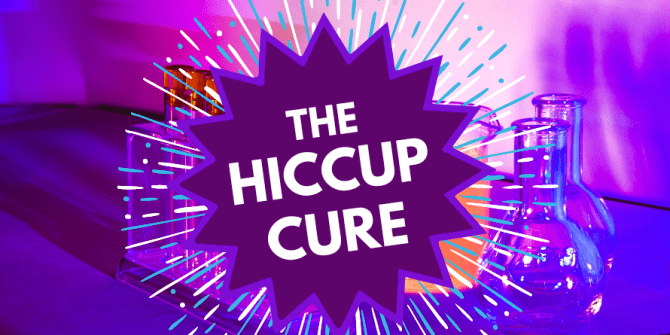
The cure for hiccups is 20 years old. I was floored when I heard this claim on the radio last month. So why have I spent hours of my life wishing there was an easy way to end this mild inconvenience? Why are there a million hiccup “cures” out there? The answer is as ridiculous as it is infuriating. First, there’s no money in the solution–there’s nothing to market, no pills to buy, no apparatus to add to your cart. Second, there’s no money in spreading the information.
The cure, officially titled, “supra-supramaximal inspiration” or SSMI for short, was published in the Anesthesia & Analgesia journal back in 2004. Since I’d loaned my copy of that journal to a friend, I thought I’d Google, “Hiccup Cure” to see how long it took me to find a mention of the 15-second SSMI technique. Five hits down the list, I found a brief mention of this technique on a Harvard University page that listed several other possibilities first. The sixth result was a very informative Atlantic article all about this technique that came to the same realization:
Harvard Health’s hiccups page was the only major health organization I could discover that even mentioned SSMI as a possibility. Other sites generally considered good sources of consumer health information—such as NHS Digital, the Mayo Clinic, and the Cleveland Clinic—mention numerous home remedies, but not SSMI.
Now, each time I get the hiccups, I use this technique. I even taught my kids, notorious fast-eaters, the technique. It works every time. My life’s mission now is to tell everyone about the technique. If you’ve seen me in the last two weeks, you’ve probably heard about it at least twice.
Sadly, when I’m done changing lives, I still find myself unsatisfied. Something just doesn’t sit right and I’m filled with so many more questions. Why did I think that hiccups weren’t settled science? Why were old wives tales the only tools I, a science-educated skeptic, had to stop this annoying biological inevitability? Are there bigger problems out there that have simple, proven solutions? How does information that contributes to the public good slip through the cracks?
Ugh. Hiccups just got more annoying. This predicament highlights a growing dissatisfaction with how information is commodified. A book on the hiccup cure would be one page long. A class to teach the method would last two minutes, max. This kind of life-changing revelation is best suited for a short article in an obscure medical journal or perhaps a short form video.
Life hack videos like this have millions of views across all social media platforms, and that translates into real money for the folks posting this content, whether they work or not. Some life hack videos are so ridiculous, Khaby Lame became famous on TikTok for highlighting the absurdity of techniques that solve problems that don’t really exist. With social media drifting toward a short video format a la TikTok and Instagram Reels, how do you fact check when you get slammed with new information every 30 seconds?
I think the answer is that we’ve gotta flex those information literacy skills. Sorry. No quick life hack for this one. When something sounds too good to be true, check a reputable source to see if it stands up. Having a life-long thirst for learning helps too. The more you know about something, the harder it is to pull your leg. I think it’s also helpful to access publicly funded sources and institutions like, bias warning, the public library. The library has a lot of great resources to help you along the way. Here’s a few that I really like:
How to Talk to A Science Denier
If all this makes you get the hiccups, remember that all you need to do is:
- Take a deep breath and hold it for 10 seconds
- Take in another sip of air and hold it for 5 seconds
- Take one last sip of air and let it all go
-Angela Hyde is the Friends & Foundation Program Coordinator at Lawrence Public Library.


Add a comment to: Hiccups Have a CURE!